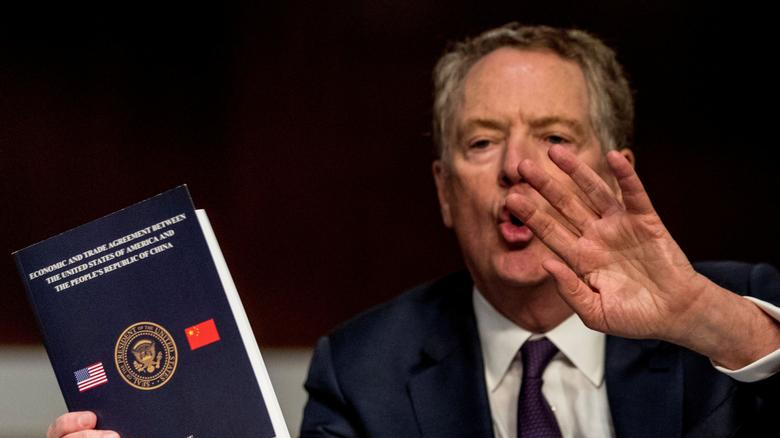
U.S. Trade Representative Robert Lighthizer holds up a document as he speaks at a Senate Finance Committee hearing on U.S. trade on Capitol Hill, in Washington D.C., June 17, 2020. /AP
U.S. Trade Representative Robert Lighthizer holds up a document as he speaks at a Senate Finance Committee hearing on U.S. trade on Capitol Hill, in Washington D.C., June 17, 2020. /AP
Editor's note: Jia Wenshan is a professor at the School of Communication at Chapman University. The article reflects the author's opinion, and not necessarily the views of CGTN.
Scott Kennedy, Senior Adviser and Trustee Chair in Chinese Business & Economics at the Center for Strategic and International Studies (CSIS), said in his blog post "Thunder out of Congress on China" that a total of 366 bills on China have been proposed to the U.S. Congress in the past two years by American lawmakers.
In the meantime, close to about 100 dialogue and communication platforms between the U.S. and China have been closed since Donald Trump became president in 2016. In addition, U.S.-China decoupling in trade, high-tech, education, culture, etc., has been taking place on a broader scale and at a deeper level. Due to these factors, the U.S.-China relationship has been becoming more and more stony, tense, and even antagonistic.
In contrast, despite the call of the Chinese mass and a growing number of elites for the National People's Congress (NPC) of China to pass some legislations against the malpractices of the U.S. against China, not a single bill has been proposed by Chinese lawmakers, let alone a piece of Chinese legislation has been passed on the U.S. as a tit-for-tat strategy.
Vices and dangers of legislating as a major tool in international relations
Legislating as an approach in the management of foreign relations or international relations such as the U.S.-China relationship is the least diplomatic in the toolkit of diplomacy and should be used both sparingly and as a last resort.
Not only is it unilateral, but it also constitutes a grave disrespect and violation of the sovereignty rights of the target country. It conceptualizes the two countries in an unequal relationship in which the U.S. is the dominant country trying to control China.
Most importantly, these actions put the U.S. in a "morally and legally superior position", ready to use the legal tools to constrain and punish the target country for its "misbehavior". It is a one-way street with a dead-end that has no way out in most situations.

The U.S. Capitol building that houses the Congress in Washington D.C., the United States. /VCG
The U.S. Capitol building that houses the Congress in Washington D.C., the United States. /VCG
Legislating against a foreign power, functioning as a substitute for weapons of destruction, only squeezes dialogue and communication out of the options and creates animosity in the government of the foreign power and its people. It is close to declaring war against it.
Could MAGA occur at the expense of China's fall through legislations?
Many U.S. lawmakers, feeling superior with their system, thus support Trump's "America First" or "Make America Great Again (MAGA)" principle, are eager to knock down China's peaceful rise on the global stage. They are obsessed with the goal of slowing down China's social and economic development.
These aims are doomed to fail for the following reasons. First, the U.S. is no longer viewed as "a shining city on the hill" by the increasing number of Americans and non-Americans.
David Litt, a former speechwriter for Barack Obama, wrote in a TIME Magazine article "The Coronavirus Crisis in the U.S. Is a Failure of Democracy", "the American republic is now a government of fewer people, by fewer people, for fewer people than at any time in the past half-century. And We, the People, are suffering because of it". He laments that American politicians' corruption has caused the bankruptcy of democracy.
Furthermore, the U.S. is no longer as resourceful and powerful as the American lawmakers think it was. New York Times columnist Nicholas Kristof illustrates this in his op-ed, "We're No.28! And Dropping" on September 9, 2020, that the Social Progress Index ranks the U.S. No.28 despite that the U.S. is ranked No.1 in university education.
He concludes, "Let's wake up, for we are no longer the country we think we are." This also means that China is no longer as weak as the U.S. thinks it is. The U.S. Congress must wake up to this new normal and stop believing in the gavel's magic power over China with an excessive amount of extra-terrestrial jurisdiction.
U.S. Congress should mind the business of the Americans
These extra-terrestrial bills and legislations cannot easily knock down China. Instead, while some Chinese may become more anti-America, others may channel the American pressure and humiliation into a stronger drive to fuel China's peaceful rise.
However, America has been wasting so much time and opportunity to fix its system and make it stronger to mend the Trump administration's self-destruction and misdirected attention and neglect of Congress on domestic affairs.
America has fallen into a chaos of politics, economics, and culture, documented by the Atlantic staff in their book "The American Crisis". It is high time the U.S. Congress shifted its focus from China to itself to make America as a country "of more people, by more people, and for more people".
After all, the U.S. Congress is the congress representing Americans, not the congress of the Americas, let alone the congress of China. The U.S. Congress should be strongly advised to carve out a two-way street of smart dialogue and communication to avoid losing its relations with China forever.
(If you want to contribute and have specific expertise, please contact us at opinions@cgtn.com.)